Nephrology (Genitourinary)
- Page Path
-
- HOME
- TOPICS
- Nephrology (Genitourinary)
- Topics
-
- Adolescence Medicine (3)
- Allergy (52)
- Cardiology (76)
- Critical Care Medicine (8)
- Developmental and Behavioral Medicine (17)
- Emergency Medicine (5)
- Endocrinology (51)
- Gastroenterology (57)
- General Pediatrics (37)
- Genetics and Metabolism (20)
- Hematology (11)
- Immunology (12)
- Infection (66)
- Neonatology (Perinatology) (103)
- Nephrology (Genitourinary) (49)
- Neurology (88)
- Nutrition (25)
- Oncology (15)
- Neurobehavior (11)
- Pulmonology (25)
- Rheumatology (2)
- Other (28)
- Editorial
- Nephrology (Genitourinary)
- Clinical considerations and practical issues of kidney complications in children after COVID-19 infection or vaccination
- Jiwon Jung, Joo Hoon Lee
- Clin Exp Pediatr. 2024;67(1):35-36. Published online November 17, 2023
-
· The proper monitoring for and treatment of coronavirus disease 2019 (COVID-19)-induced acute kidney injury, which is common in critically ill children, are recommended.
· Glomerulopathy associated with COVID-19 or its vaccination has been reported, and the overall clinical course is similar to that of non-COVID-19-associated diseases.
· Additional COVID-19 vaccinations are recommended; however, careful and individualized decisions should be made in patients with COVID-19- or vaccination-associated glomerulopathy.
- Review Article
- Nephrology (Genitourinary)
- X-linked hypophosphatemic rickets: from diagnosis to management
- Eujin Park, Hee Gyung Kang
- Clin Exp Pediatr. 2024;67(1):17-25. Published online June 14, 2023
-
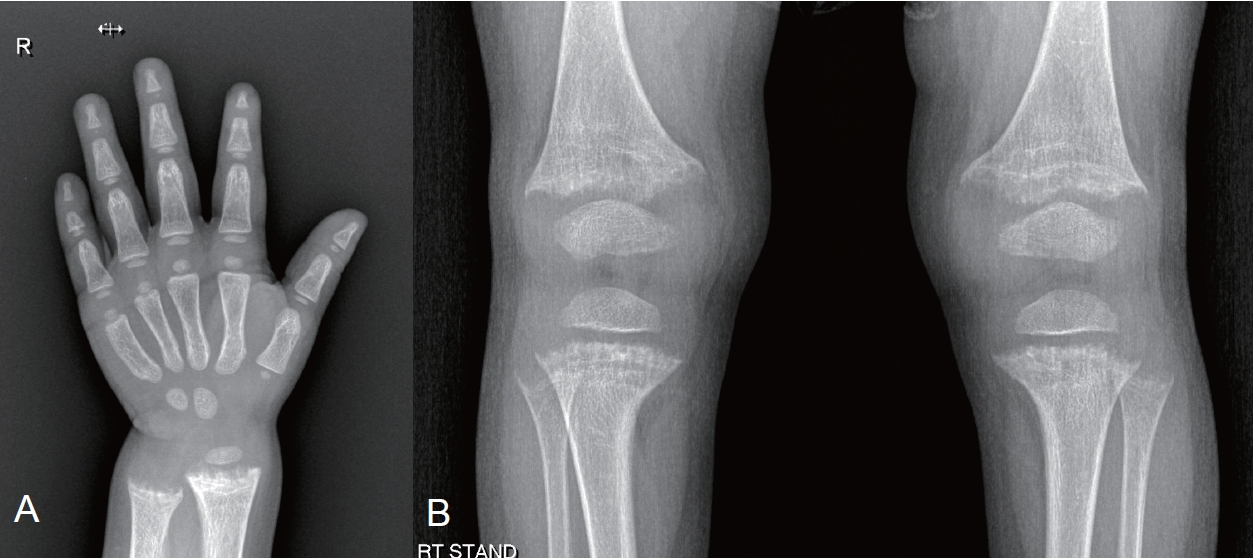
· X-linked hypophosphatemia (XLH), the most common cause of hypophosphatemic rickets, affects 1/20,000 people.
· XLH is caused by a loss-of-function mutation of the PHEX gene.
· Its main pathogenesis is elevated fibroblast growth factor-23 (FGF23) level.
· Burosumab, an FGF23 inhibitor, was developed in the early 2000s.
· Burosumab was approved in Korea in 2020 for XLH patients aged 1+ years with radiographic evidence of bone disease.
- Kidney complications associated with COVID-19 infection and vaccination in children and adolescents: a brief review
- Hee Sun Baek, Min Hyun Cho
- Clin Exp Pediatr. 2023;66(10):424-431. Published online June 28, 2023
-
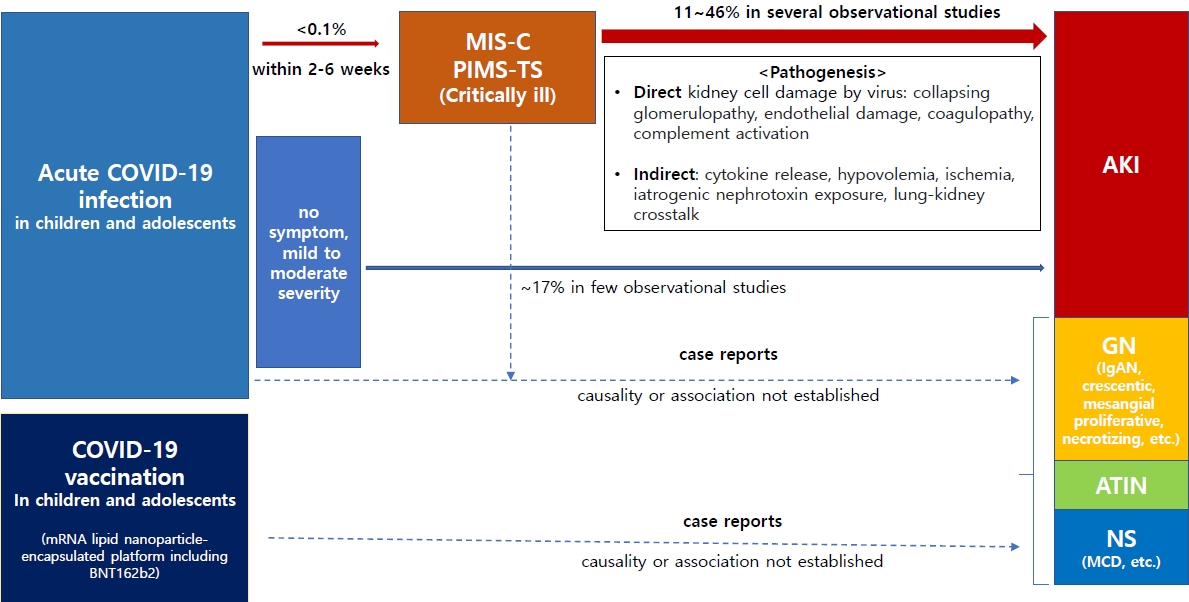
Several observational studies have shown that acute kidney injury affects up to 46% of children and adolescents who develop severe postinflammatory responses, such as multisystem inflammatory syndrome in childhood, due to coronavirus disease 2019 (COVID-19). Although causality has not been established, some cases of glomerulopathy or nephrotic syndrome occurring after COVID-19 infection or vaccination have been reported. Therefore, kidney complications associated with these conditions in children and adolescents warrant attention.
- Editorial
- Nephrology (Genitourinary)
- Optimal hemodialysis treatment for pediatric kidney failure patients
- Yo Han Ahn
- Clin Exp Pediatr. 2023;66(3):125-126. Published online February 15, 2023
-
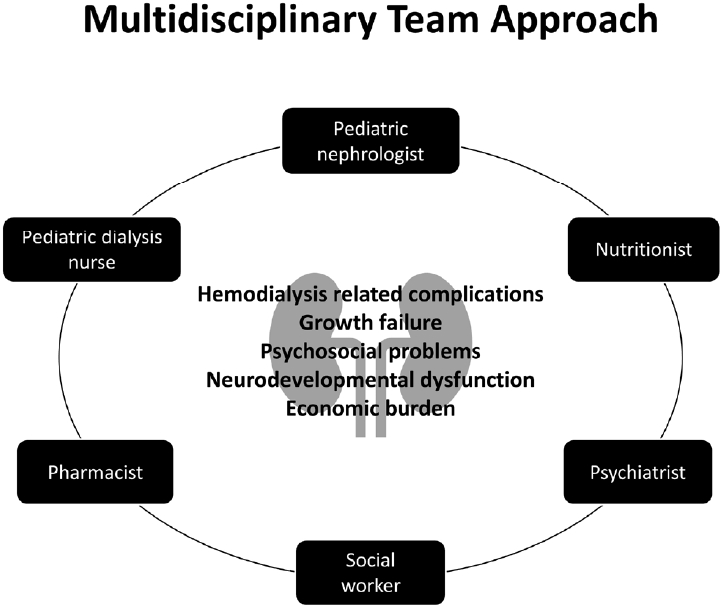
· Although the basic concept of hemodialysis (HD) is similar in adults and children, specific factors must be considered in the latter, including the small dialyzer and circuit, difficult vascular access, and frequent complications.
· HD-associated complications include catheter-related problems, hemodynamic instability, and neurodevelopmental and cognitive dysfunction.
· Pediatric HD is challenging, and steady efforts are needed to perform it safely and reduce its complications, thereby improving clinical outcomes.
- Hypertension in adulthood is programmed during the perinatal period
- Min Hyun Cho
- Clin Exp Pediatr. 2022;65(10):494-495. Published online August 12, 2022
-
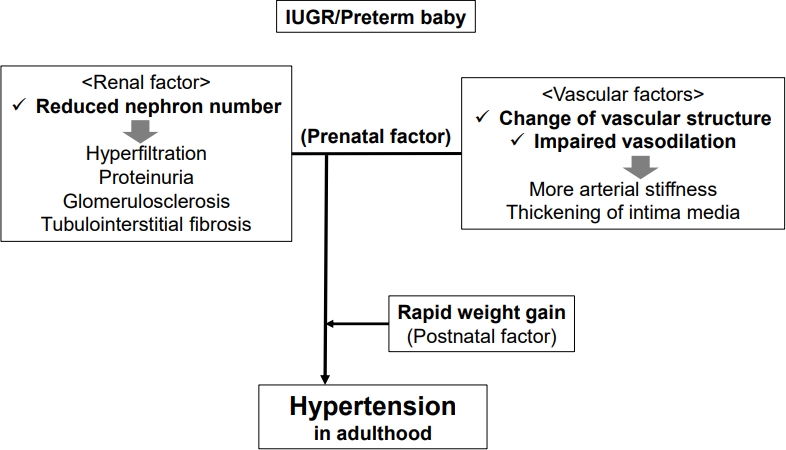
∙ Intrauterine growth restriction (IUGR) and preterm birth can be significant risk factors for the development of adult hypertension.
∙ Several perinatal factors of hypertension are related to IUGR, including renal, vascular, and rapid catch-up growth.
- Review Article
- Nephrology (Genitourinary)
- Neonatal hypertension: concerns within and beyond the neonatal intensive care unit
- Kathleen Altemose, Janis M. Dionne
- Clin Exp Pediatr. 2022;65(8):367-376. Published online May 30, 2022
-
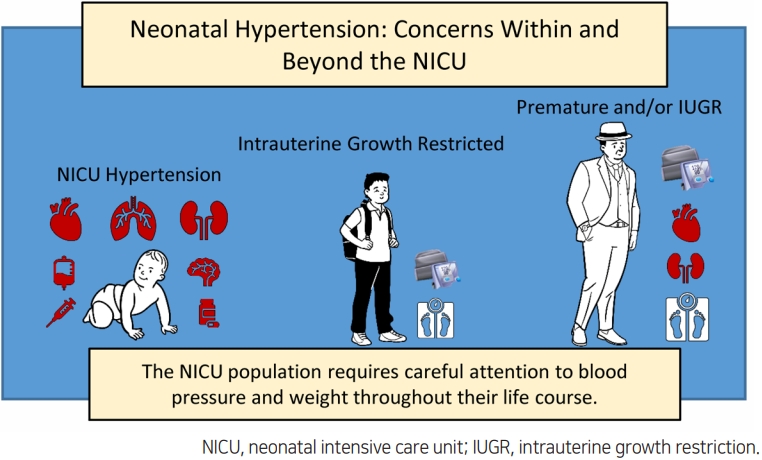
Some neonates, especially those who are premature, may experience hypertension while in the neonatal intensive care unit (NICU). The most common causes are prematurity-related and the hypertension usually resolves over the first 1–2 years of life. Unfortunately, the increasing population of NICU graduates is at risk for later cardiovascular and kidney disease in childhood and adulthood. This population requires careful attention to blood pressure and weight throughout their life course.
- Blood pressure measurements and hypertension in infants, children, and adolescents: from the postmercury to mobile devices
- Seon Hee Lim, Seong Heon Kim
- Clin Exp Pediatr. 2022;65(2):73-80. Published online September 15, 2021
-

· Hypertension is defined as a blood pressure (BP) >90th (elevated) or 95th (hypertension) percentile in children by height, age, and sex and >95th percentile in neonates by age, birth weight, and sex.
· Although the oscillometric method can be used for screenings, the auscultatory method remains the gold standard. The hybrid method employs the auscultatory and electronic methods and can reduce bias.
· BP measurement mobile device applications have a potential for development.
- Editorial
- Nephrology (Genitourinary)
- Obesity and chronic kidney disease: what should pediatric nephrologists know?
- Jung Won Lee
- Clin Exp Pediatr. 2021;64(10):521-522. Published online June 1, 2021
-
• Obesity is not only a comorbidity of hypertension, it may be a riskfactorfor chronickidneydisease.
• Renal impairment associated with obesity is believed to start early in childhood and continue into adulthood, implying a higher risk of adverse cardiovascular events.
• The identification of kidney injury, implementation of preventive strategies, and prompt treatment are essential to improving clinical outcomes in obese children with early kidney disease.
- Review Article
- Nephrology (Genitourinary)
- Obesity and chronic kidney disease: prevalence, mechanism, and management
- Hyung Eun Yim, Kee Hwan Yoo
- Clin Exp Pediatr. 2021;64(10):511-518. Published online April 6, 2021
-
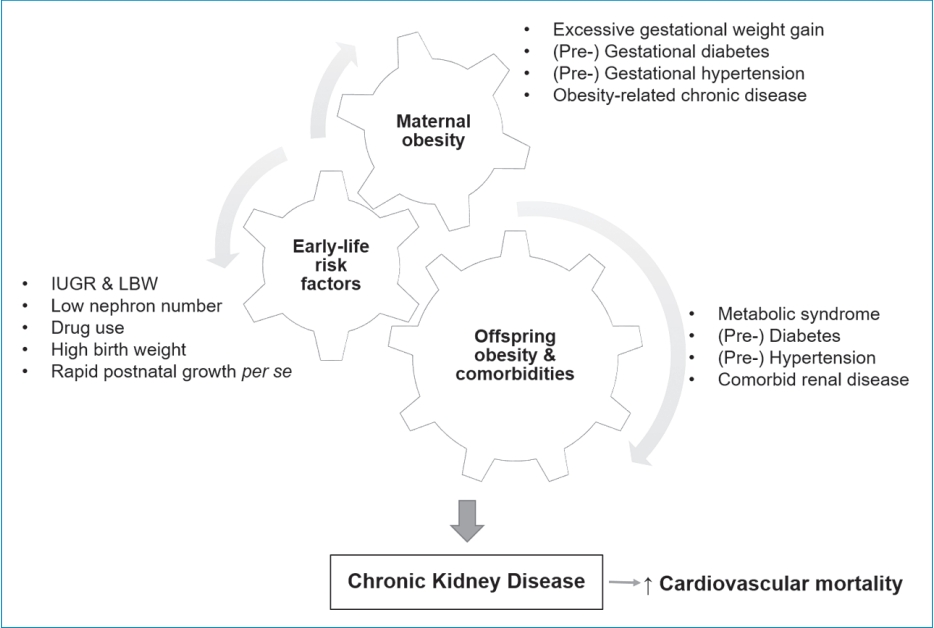
· Obesity is strongly associated with the development and progression of chronic kidney disease.
· Altered renal hemodynamics, metabolic effects, and lipid nephrotoxicity may play a key role in the development of obesity-related kidney disease.
· Children born to obese mothers are at increased risk of developing obesity and chronic kidney disease later in life.
· A multilevel approach is needed to prevent obesity and related chronic diseases.
- Clinical note
- Nephrology (Genitourinary)
- Extracorporeal membrane oxygenation with systemic heparinization as a rescue therapy for acute life-threatening pulmonary thromboembolism complicating nephrotic syndrome
- Kyusang You, So Mi Kim, Dongmin Kim, Kyoungmin Ryu, Mee Jeong Lee
- Clin Exp Pediatr. 2021;64(8):430-432. Published online November 16, 2020
-
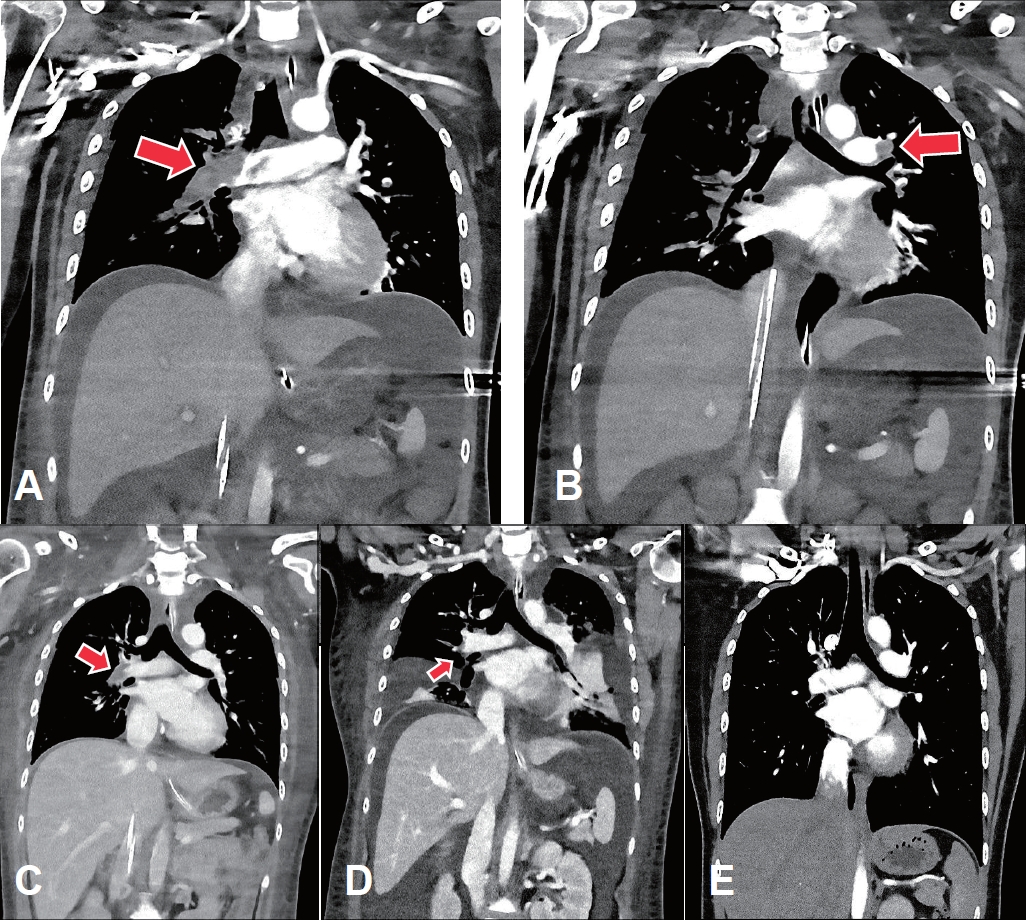
Question: How would you treat acute life-threatening pulmonary thromboembolism occurring in nephrotic patients?
Finding: A 16-year-old woman with minimal change-associated nephrotic syndrome presented with cardiac arrest caused by an acute bilateral pulmonary thromboembolism. Her hemodynamics stabilized with resolution of thrombi while on venoarterial extracorporeal membrane oxygenation (ECMO) and systemic heparinization.
Meaning: In selected cases, ECMO with systemic heparinization may rescue patients from acute life-threatening pulmonary thromboembolism even without reperfusion therapy.
- Editorial
- Nephrology (Genitourinary)
- Pulmonary thromboembolism: a rare but life-threatening complication of nephrotic syndrome
- Heeyeon Cho
- Clin Exp Pediatr. 2021;64(8):406-407. Published online February 4, 2021
-
Pulmonary thromboembolism (PTE) is often diagnosed in children with nephrotic syndrome. Massive PTE can cause hemodynamic instability, right ventricular failure, and circulatory collapse. Extracorporeal membrane oxygenation can be used for massive PTE as a method of hemodynamic support and adjunct to surgical embolectomy.
- Original Article
- Nephrology (Genitourinary)
- Expression profiling of cultured podocytes exposed to nephrotic plasma reveals intrinsic molecular signatures of nephrotic syndrome
- Stuti Panigrahi, Varsha Chhotusing Pardeshi, Karthikeyan Chandrasekaran, Karthik Neelakandan, Hari PS, Anil Vasudevan
- Clin Exp Pediatr. 2021;64(7):355-363. Published online November 1, 2020
-
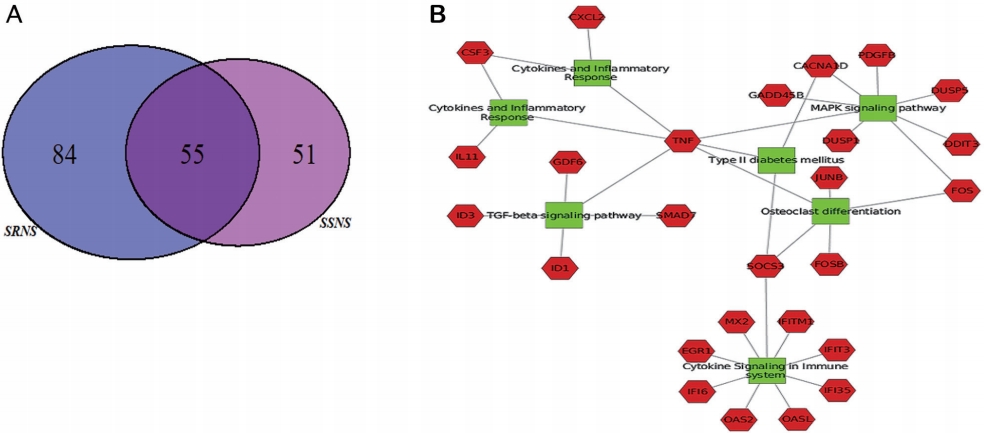
Question: Is it possible to classify nephrotic syndrome (NS) through gene expression profiling of podocytes exposed to NS plasma?
Finding: Our data showed different expression profiles in podocytes exposed to nephrotic plasma from different clinical groups, suggesting the molecular stratification of patients into intrinsic subtypes.
Meaning: Transcriptome profiling of podocytes treated with NS plasma can stratify patients into intrinsic subtypes and provide insight into the molecular mechanisms of podocyte injury.
- Urinary neutrophil gelatinase-associated lipocalin: a marker of urinary tract infection among febrile children
- Ji Hyun Moon, Kee Hwan Yoo, Hyung Eun Yim
- Clin Exp Pediatr. 2021;64(7):347-354. Published online October 17, 2020
-
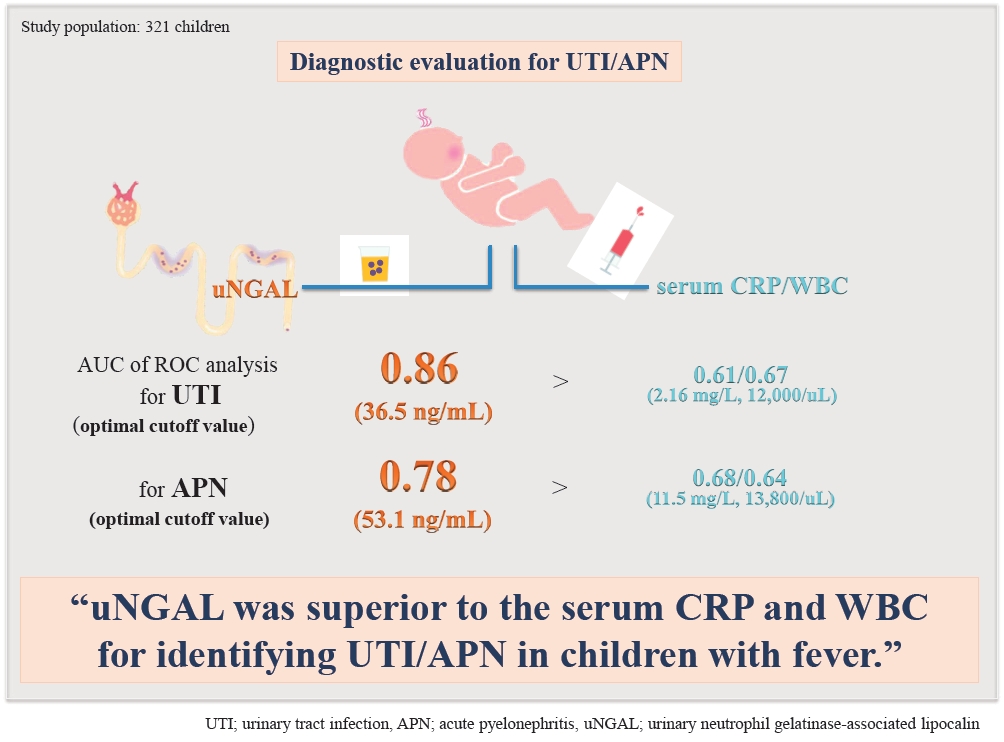
Question: Reliably diagnosing urinary tract infection (UTI) in febrile children is often difficult. Can urinary neutrophil gelatinase-associated lipocalin (uNGAL) better predict UTI and acute pyelonephritis (APN) than serum C-reactive protein (CRP) and white blood cell (WBC) count?
Finding: uNGAL better facilitated the prediction of UTI and APN, than serum CRP and WBC counts in febrile children.
Meaning: uNGAL is a suitable biomarker for UTI and APN in febrile children.
- Editorial
- Nephrology (Genitourinary)
- Inhibition of the renin-angiotensin system during fetal kidney development
- Eujin Park
- Clin Exp Pediatr. 2021;64(3):121-122. Published online September 22, 2020
-
· Fetal exposure to renin-angiotensin system (RAS) inhibitors leads to short- and long-term kidney complications.
· Women of reproductive age who are absolutely indicated for RAS inhibitors should be adequately informed of the risks for the duration of treatment.
- Original Article
- Nephrology (Genitourinary)
- Sonographic renal length and volume of normal Thai children versus their Chinese and Western counterparts
- Chantima Rongviriyapanich, Thanarat Sakunchit, Chirawat Sudla, Supamas Mungkung, Napapong Pongnapang, Chai Hong Yeong
- Clin Exp Pediatr. 2020;63(12):491-498. Published online July 13, 2020
-
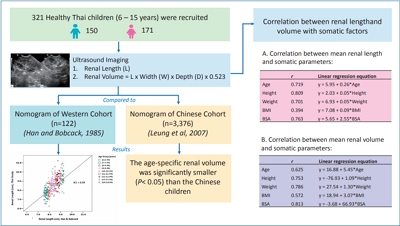
Question: What is the normal renal size of Thai children and is the renal nomogram comparable to those of Western and Chinese cohorts?
Finding: The renal length of Thai children was moderately correlated with that of Western children, while the age-specific renal volume was significantly smaller than that of Chinese children.
Meaning: Renal size in children can vary among regions and sociodemographic backgrounds; hence, a local reference standard is needed.
- Editorial
- Nephrology (Genitourinary)
- Undescended testis: importance of a timely referral to a surgical specialist
- Su Jin Kim
- Clin Exp Pediatr. 2020;63(11):429-430. Published online March 23, 2020
-
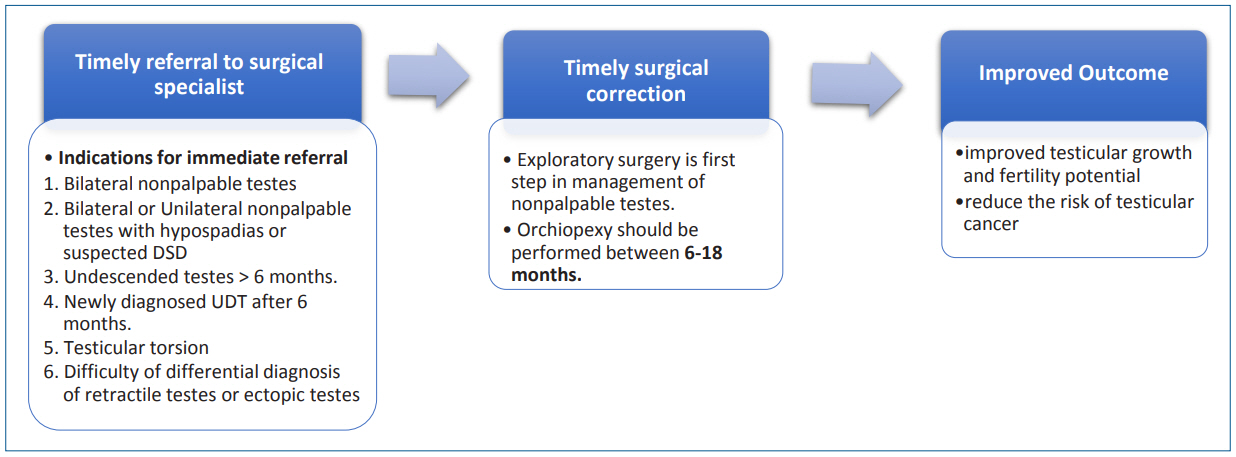
Undescended testes (UDT) is the most common congenital genitourinary abnormality in male infants and associated with decreased fertility and a higher future malignancy risk, especially in cases of delayed orchiopexy after puberty. It is important to timely referral to a surgical specialist and timely surgical correction of UDT to improve fertility and decrease the risk of malignancy.
- Clinical Note
- Nephrology (Genitourinary)
- First episode of nephrotic syndrome with acute abdominal pain
- Samridhi Goyal, Rachita Singh Dhull, Bobbity Deepthi, Abhijeet Saha
- Clin Exp Pediatr. 2020;63(10):411-414. Published online July 21, 2020
-
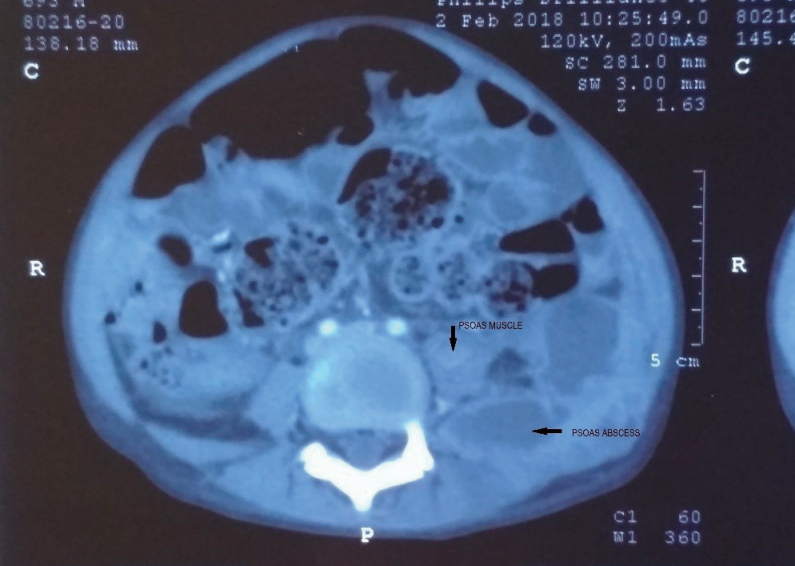
Question: What are the likely causes of pain abdomen in Nephrotic syndrome?
Finding: Severe hypovolemia leading to mesenteric ischemia, spontaneous bacterial peritonitis, gastroenteritis, adverse effect of corticosteroids leading to gastritis, mesenteric ischemia due to thromboembolism, acute appendicitis, intussusception due to severe gut wall oedema and rarely Psoas abscess.
Meaning: Clinical suspicion and careful investigation is warranted to diagnose rare cause of pain abdomen like Psoas abscess.
- Editorial
- Nephrology (Genitourinary)
- Dapsone: a steroid-sparing drug for refractory immunoglobulin A vasculitis?
- Jin-Soon Suh
- Clin Exp Pediatr. 2020;63(5):178-179. Published online April 14, 2020
-
- Review Article
- Nephrology (Genitourinary)
- Treatment of refractory IgA vasculitis with dapsone: a systematic review
- Keum Hwa Lee, Sung Hwi Hong, Jinhae Jun, Youngheun Jo, Woogyeong Jo, Dayeon Choi, Jeongho Joo, Guhyun Jung, Sunghee Ahn, Andreas Kronbichler, Michael Eisenhut, Jae Il Shin
- Clin Exp Pediatr. 2020;63(5):158-163. Published online September 24, 2019
-
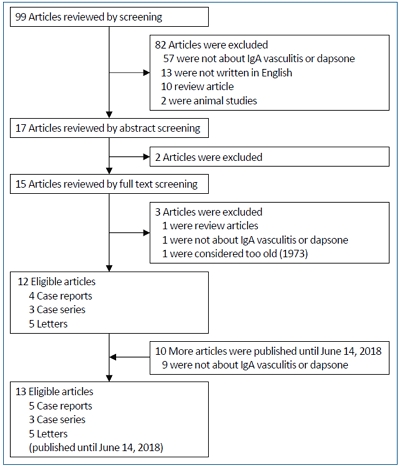
IgA vasculitis, formerly known as Henoch-Schönlein purpura, is a systemic IgA-mediated vasculitis of the small vessels commonly seen in children. The natural history of IgA vasculitis is generally self-limiting; however, one-third of patients experience symptom recurrence and a refractory course. This systematic review examined the use of dapsone in refractory IgA vasculitis cases. A literature search of PubMed databases retrieved...
- Original Article
- Nephrology (Genitourinary)
- Variation in clinical usefulness of biomarkers of acute kidney injury in young children undergoing cardiac surgery
- Hee Sun Baek, Youngok Lee, Hea Min Jang, Joonyong Cho, Myung Chul Hyun, Yeo Hyang Kim, Su-Kyeong Hwang, Min Hyun Cho
- Clin Exp Pediatr. 2020;63(4):151-156. Published online February 5, 2020
-
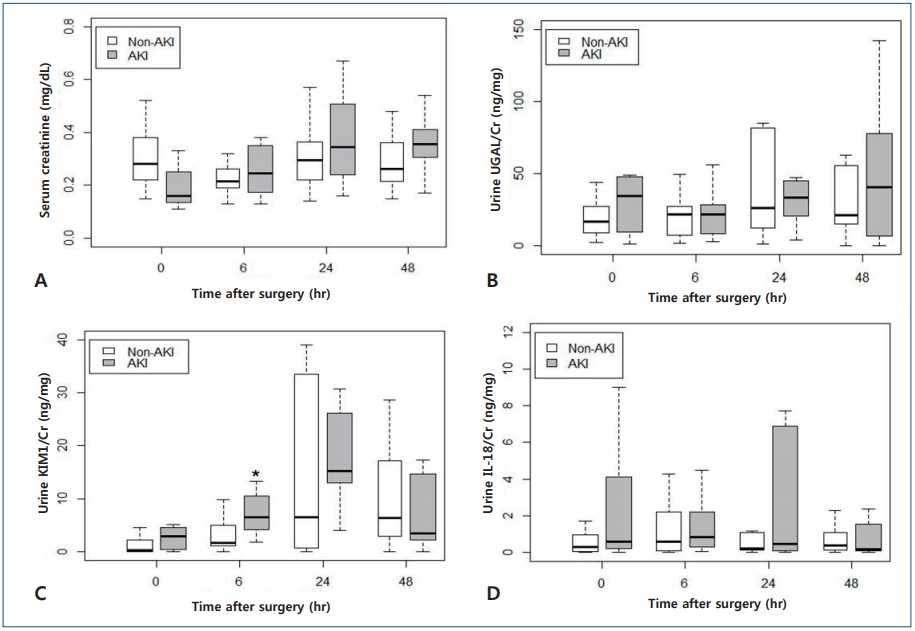
Question: Can clinical usefulness of biomarkers of acute kidney injury vary on the clinical circumstances?
Finding: In young children undergoing cardiac surgery, urine KIM-1/Cr level peaked at 24 hours with significant difference from baseline level and was significantly higher at 6 hours in the AKI group. However, urine NGAL/Cr and IL-18/Cr levels showed no specific trend with time for 48 hours after cardiac surgery.
Meaning: Urine KIM-1/Cr concentration could be considered a good biomarker for early AKI prediction after open cardiac surgery in young children.
- Editorial
- Nephrology (Genitourinary)
- Is there a simple and less invasive way to accurately diagnose acute pyelonephritis?
- Seong Heon Kim
- Clin Exp Pediatr. 2019;62(12):442-443. Published online November 19, 2019
-
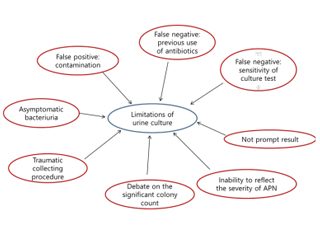
- Review Article
- Nephrology (Genitourinary)
- Reconsideration of urine culture for the diagnosis of acute pyelonephritis in children: a new challenging method for diagnosing acute pyelonephritis
- Jun Ho Lee, Seonkyeong Rhie
- Clin Exp Pediatr. 2019;62(12):433-437. Published online October 18, 2019
-
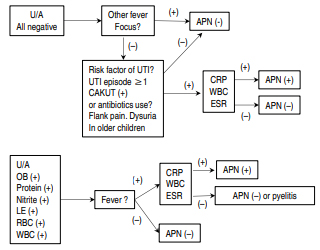
Acute pyelonephritis (APN) should be detected and treated as soon as possible to reduce the risk of the development of acquired renal scarring. However, in the medical field, urine culture results are not available or considered when the prompt discrimination of APN is necessary and empirical treatment is started. Furthermore, urine culture cannot discriminate APN among children with febrile urinary...
- Original Article
- Nephrology (Genitourinary)
- Clinical manifestations of BK virus infection in pediatric kidney transplant patients
- Yiyoung Kwon, Jeong Yeon Kim, Yeonhee Lee, Heeyeon Cho
- Clin Exp Pediatr. 2019;62(11):422-427. Published online September 5, 2019
-

Background: Polyomavirus BK (BKV) infection is an important cause of graft loss in kidney transplant patients.
Purpose: The purpose of this study was to evaluate clinical findings and risk factors for BKV in pediatric patients after kidney transplantation. Methods: This retrospective single-center study included 31 pediatric kidney transplant recipients from January 2002 to December 2017. Two patients received 2 transplantations during the...
- Editorial
- Nephrology (Genitourinary)
- Monitoring BK virus infection in pediatric kidney transplant recipients
- Min Hyun Cho
- Clin Exp Pediatr. 2019;62(11):414-415. Published online October 18, 2019
-
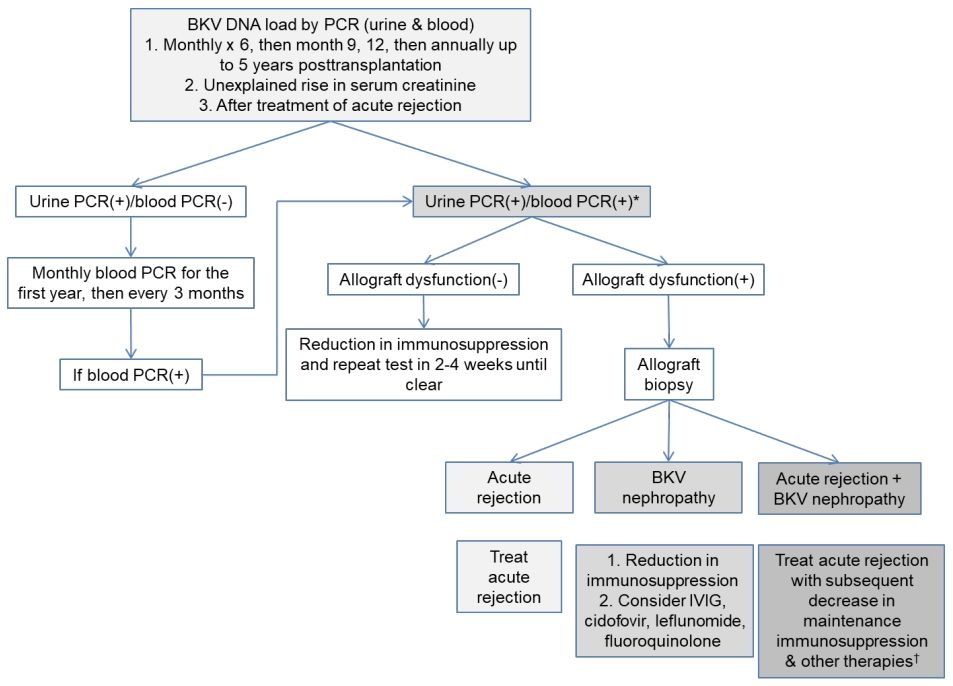
- Case Report
- Nephrology (Genitourinary)
- De novo mutations in COL4A5 identified by whole exome sequencing in 2 girls with Alport syndrome in Korea
- Kyoung Hee Han, Jong Eun Park, Chang-Seok Ki
- Clin Exp Pediatr. 2019;62(5):193-197. Published online November 26, 2018
-
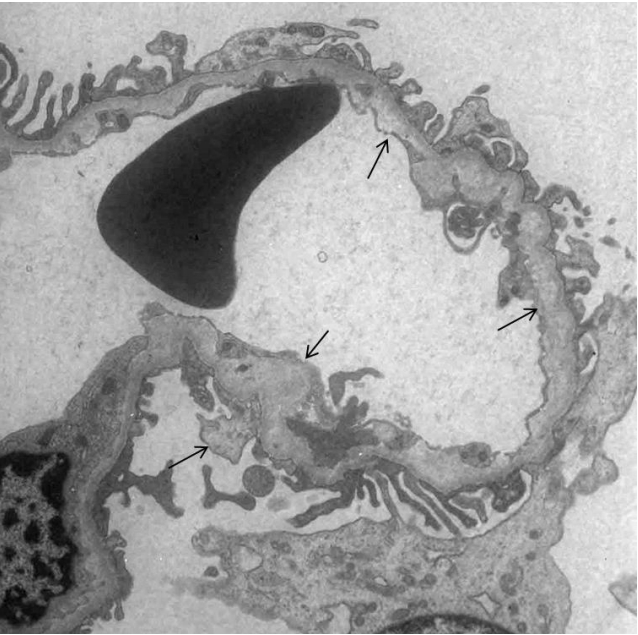
Alport syndrome (ATS) is an inherited glomerular disease caused by mutations in one of the type IV collagen novel chains (α3, α4, and α5). ATS is characterized by persistent microscopic hematuria that starts during infancy, eventually leading to either progressive nephritis or end-stage renal disease. There are 3 known genetic forms of ATS, namely X-linked ATS, autosomal recessive ATS, and...
- Editorial
- Nephrology (Genitourinary)
- Genetic diagnosis of Alport syndrome
- Hae Il Cheong
- Clin Exp Pediatr. 2019;62(5):164-165. Published online January 3, 2019
-
- Original Article
- Nephrology (Genitourinary)
- Changes in the thyroid hormone profiles in children with nephrotic syndrome
- Sun Hee Jung, Jeong Eun Lee, Woo Yeong Chung
- Clin Exp Pediatr. 2019;62(3):85-89. Published online October 4, 2018
-
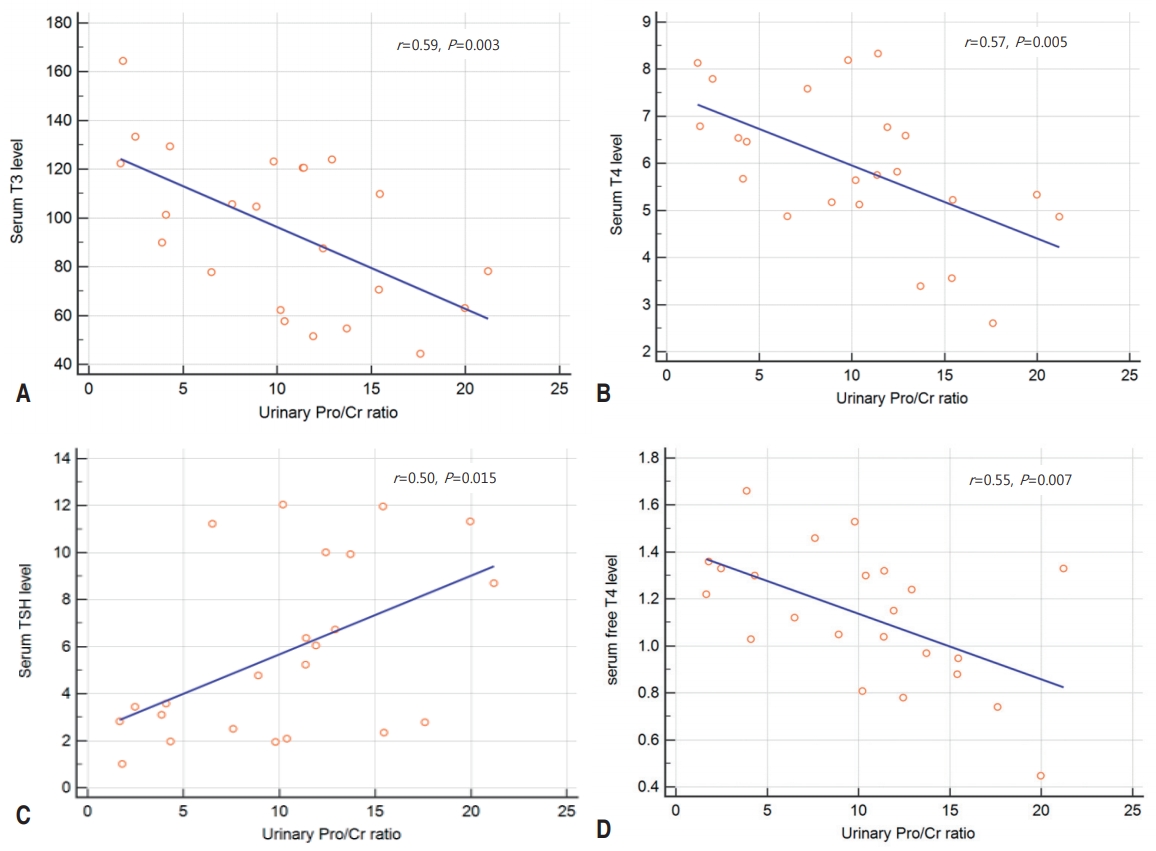
Purpose: We compared thyroid hormone profiles in children with nephrotic syndrome (NS) during the nephrotic phase and after remission. Methods: This study included 31 pediatric NS patients. The thyroid hormone profiles included serum levels of triiodothyronine (T3), thyroxine (T4), thyroid-stimulating hormone (TSH), and free T4. Results: Of the 31 patients, 16 (51.6%) showed abnormal thyroid hormone profiles: 6 had overt hypothyroidism, 8...
- Review Article
- Nephrology (Genitourinary)
- Renal replacement therapy in neonates with an inborn error of metabolism
- Heeyeon Cho
- Clin Exp Pediatr. 2019;62(2):43-47. Published online November 7, 2018
-
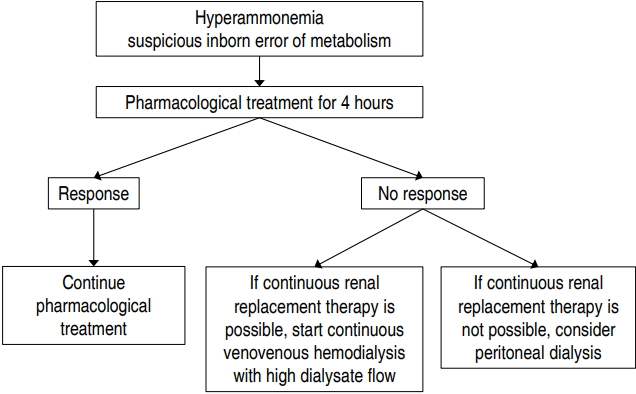
Hyperammonemia can be caused by several genetic inborn errors of metabolism including urea cycle defects, organic acidemias, fatty acid oxidation defects, and certain disorders of amino acid metabolism. High levels of ammonia are extremely neurotoxic, leading to astrocyte swelling, brain edema, coma, severe disability, and even death. Thus, emergency treatment for hyperammonemia must be initiated before a precise diagnosis is...
- Acute kidney injury and continuous renal replacement therapy in children; what pediatricians need to know
- Myung Hyun Cho, Hee Gyung Kang
- Clin Exp Pediatr. 2018;61(11):339-347. Published online October 23, 2018
-
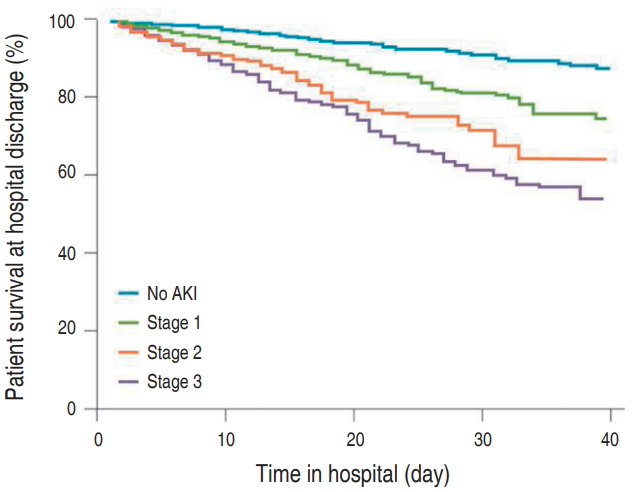
Acute kidney injury (AKI) is characterized by abrupt deterioration of renal function, and its diagnosis relies on creatinine measurements and urine output. AKI is associated with higher morbidity and mortality, and is a risk factor for development of chronic kidney disease. There is no proven medication for AKI. Therefore, prevention and early detection are important. Physicians should be aware of...
- Original Article
- Nephrology (Genitourinary)
- Renal involvement in children and adolescents with inflammatory bowel disease
- Hea Min Jang, Hee Sun Baek, Jung-Eun Kim, Ju Young Kim, Yeon Hee Lee, Hee Yeon Cho, Yon Ho Choe, Ben Kang, Byung-Ho Choe, Bong Seok Choi, Min Hyun Cho
- Clin Exp Pediatr. 2018;61(10):327-331. Published online September 12, 2018
-

Purpose: The incidence of inflammatory bowel disease (IBD) is rapidly increasing, and several reports have described the renal complications of IBD. We sought to evaluate the clinical manifestations of renal complications in children with IBD in order to enable early detection and prompt treatment of the complications. Methods: We retrospectively reviewed the medical records of 456 children and adolescents aged <20...
-

-
-

-

-
Impact Factor4.2
-
6.52022CiteScore92nd percentilePowered by







